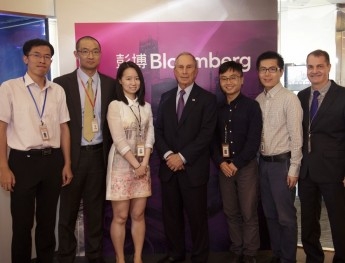
U.S. President Donald Trump will lose his bid for re-election in 2020 unless there is a significant shift in American public opinion before the Nov. 3 election, two leading U.S. political journalists told Tsinghua University students on Sept. 15.
Alexis Simendinger and Al Weaver, co-creators of The Hill’s Morning Report newsletter, told a Global Business Journalism Lecture Series audience that former U.S. Vice President Joe Biden was leading Trump nationally in mid-September by an average of 7.5 percentage points.
“This election is ending up very much where it started,” said Simendinger, a veteran political reporter who has covered the White House for National Journal and RealClearPolitics.com. “The polls have been relatively consistent since last year. In other words, Joe Biden has been ahead of President Trump in national polls since 2019.”
The session, the first Global Business Journalism (GBJ) Lecture Series event of the 2020-2021 academic year, was streamed live worldwide via Zoom. Students in the Global Business Journalism’s “Hot Topics” graduate course and the Tsinghua School of Journalism and Communication’s undergraduate English news writing course attended the session and asked questions of the guests.
In most presidential election years, the guests said, analysts would predict Trump would be defeated because his job approval remains consistently below 50 percent; tens of millions of Americans are unemployed, the administration is struggling to contain a virus that has killed more than 200,000 Americans, and two-thirds of Americans believe the country is on the wrong track. In addition, Trump must overcome demographic shifts that have made the U.S. electorate younger and with a larger percentage of minorities than at any time in the nation’s history – both demographic blocs that strongly disapprove of Trump.
Trump’s biggest advantage is the United States’ indirect system of electing a president through the Electoral College rather than by direct popular vote. The Electoral College system favors small states, which overwhelmingly vote Republican. Four years ago, Democrat Hillary Clinton won the popular vote by more than two percentage points but lost soundly to Trump in the Electoral College.
“When we look at the state polling, or the national polling, what we are trying to consider is what’s happening in the [key] states where the votes seem to be really close,” Simendinger added.
Weaver told the students that the election will be decided by the results in 10 of America’s 50 states. Among them are six states won by Trump in 2016: Florida, Arizona, Nevada, Pennsylvania, Michigan and Wisconsin. Biden needs to win three or four of the 10 swing states to win the election. To do that, the Democrat needs to make inroads among educated white women, particularly in suburban areas.
“Suburban women are really not fans of how the president communicates with them,” he said.
While more than 90 percent of Americans have already decided on a candidate, the small percentage of uncommitted voters could tip the election to Trump if the incumbent dominates among late-deciding voters.
“There may be at least six percent of eligible voters out there who are truly undecided and persuadable,” Simendinger said. “Either Joe Biden or President Trump can go after them and try to persuade them or try to encourage them to see their way and vote for them.”
Professor Rick Dunham, who hosted the lecture, warned the students that most analysts incorrectly predicted a Clinton win four years ago when polls also showed Trump trailing.
“You never count Donald Trump out,” said Professor Dunham, a 29-year veteran of Washington political coverage. “He is well known as an ahistorical president, meaning historical norms don’t seem to apply to him.”
The Global Business Journalism Lecture Series is free and open to the public. Most of the lectures will take place on Tuesdays at 9 p.m., China time.
You do not need to be enrolled in the courses to participate in the lecture series. All lectures are open to Global Business Journalism students, alumni, prospective students, and GBJ friends.
Upcoming lectures will be posted on the Global Business Journalism international website at